Laughing through Tikal
 Atop a temple at Tikal. Julie, Bill, Hector and Marco. Photo by some hapless tourist recruit.
Atop a temple at Tikal. Julie, Bill, Hector and Marco. Photo by some hapless tourist recruit.As the first flakes of the snowstorm that clobbered Birdchick in Nebraska float down, I am turning away from the darkening skies and dreaming of orchids in Guatemala, of friends in Guatemala. Marco Centeno is a professor of ornithology at a university in Guatemala City, and Hector Castaneda is a teacher of orchidology and birding tour leader. Both are the finest kind, gentle and sweet and funny as all get out. When we met at the airport to travel to Tikal, we started laughing at the ticket counter and laughed pretty much the whole time we were together. Many of the jokes centered around the fact that Marco and Bill are twice the size of Hector and me. And that Bill and I thought we might want to adopt a Guatemalan child. I want one who's fluent in English, has a great sense of humor, and teaches orchidology. We found one who is very cute, and available, but he smokes, so I am going to try to find another.
Whenever I'm in the tropics, I go on sensory overdrive--the sights and smells and forms are all so different--so much bigger and brighter--than they are back home. I especially like the plus-sized flowers and leaves. The sheaths from banana flowers make fabulous fake lips. Here, Bill, bite this.
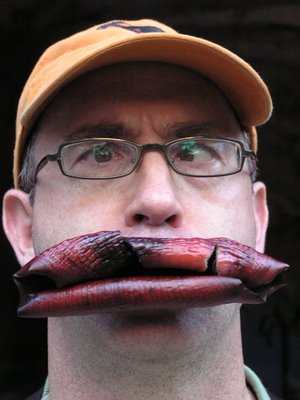
There are many flower parts that will fit over your nose and ears, as well. Finding them on the forest trails fills the moments when you're not chasing some weird bird call. Just make sure there's not a scorpion or soldier ant in them before applying.
As an orchid freak, it was pure joy for me to walk through Tikal's humid forest with Hector. "What's that, Hector?" And he'd give me the genus and species and a short course on its natural history and distribution.
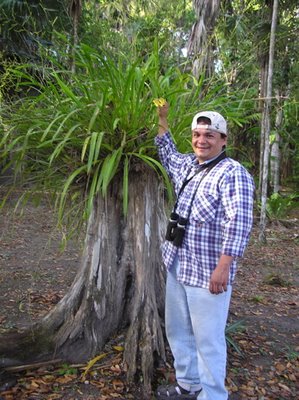 Aww, he's soo cute. Maybe I'll reconsider. Hold on Hector, we're coming back to get you.
Aww, he's soo cute. Maybe I'll reconsider. Hold on Hector, we're coming back to get you.Here, Hector's holding Oeceoclades maculata, a very unusual terrestrial orchid native to Nigeria. It's strange, because it lives in soil (rather than as an epiphyte, on tree branches), has water-storing pseudobulbs (typical of an epiphyte) and velamin-coated roots (again, an epiphyte characteristic). This critter has all its bases covered, and it is an aggressive invader of humid forest floor. It was a surprise to me to see an orchid as a noxious pest! Hector says it displaces native terrestrial orchids. Amazing. We saw other noxious exotics, including lantana and our own beloved impatiens. Coffee growers hate impatiens because they sap nutrients from the soil. Such things I learned traveling with Hector and Marco.
 Laughing again. Hard to catch Hector not laughing.
Laughing again. Hard to catch Hector not laughing.Orchids in the wild are so happy. They make the lovely things on our windowsills look like little caged canaries. This Oncidium was a living fountain of brilliant yellow flowers.
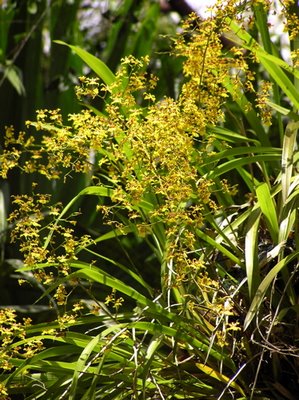 I have one languishing at home that has yet to bloom. It will, I know, but when I see what these plants are really capable of, I get the same feeling I do when I see wild macaws and parrots--guilt.
I have one languishing at home that has yet to bloom. It will, I know, but when I see what these plants are really capable of, I get the same feeling I do when I see wild macaws and parrots--guilt.Not guilty enough to stop me from taking a road trip to the orchid show at the Franklin Park Conservatory this weekend, however. I hear they may have Encyclia cordigera there, and I aim to get one languishing on my windowsill by Saturday! Captive-propagated, of course...
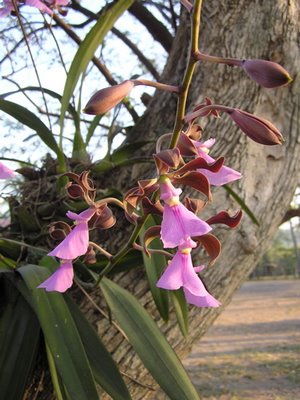 this perfect creature was growing on a tree at a restaurant by the highway. I swooned. It smelled like muguet in Paradise.
this perfect creature was growing on a tree at a restaurant by the highway. I swooned. It smelled like muguet in Paradise.

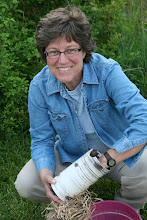

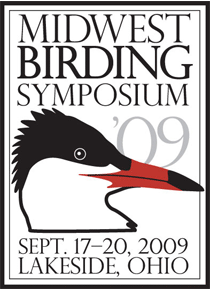


<< Home